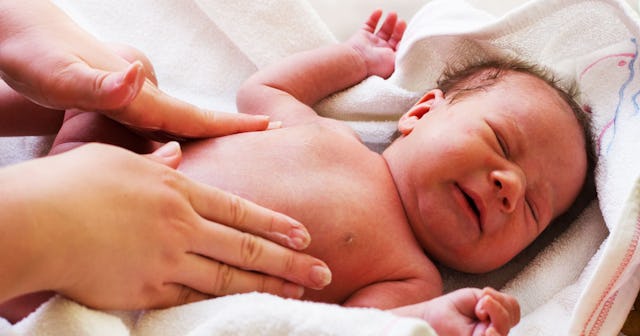Newborn Gut Deficiency: What You Need To Know

As a pregnant person, I worried a lot. Part of my fear was due to my own birth, born at 6 months; at 1lb and 10oz, I am told that my life held in the balance of doctors and God. I spent three months in the neonatal unit before being discharged from my lengthy hospital stay. When it came to the birth of my twin daughters, I carried the “what if” fears with me, like most moms-to-be do. For me, success was had just getting to a healthy delivery of these two little girls I’d waited all of my life to give birth to.
It wasn’t until after their birth, their release from the hospital after our 5-day stint after my c-section, that the very real new mom worry set in, and shortly after that newfound worry took up residence in every part of my being, the feeding worries began: were they getting enough food, when would my breastmilk fully come in, could they survive on breastmilk alone, what’s really in formula, and so many others.
When my newborn daughter began throwing up after almost every feeding, it made me think about what her little belly endured every time she ate. After much research, it was discovered that her digestive issues seemed to stem from something most parents aren’t even aware of: newborn gut deficiency. I wish I’d had more information readily available, because I know I’m not the only mom who struggled to find out what was wrong with their baby’s gut. But what does it take to give your newborn a healthy gut? And what can happen later in life to their health if their gut isn’t healthy in those early years?
I recently sat down to talk to new mom Katherine Schwarzenegger-Pratt about how to protect your baby’s gut health. Like me, Katherine was also unaware of how much gut health impacts your baby’s overall health. As a mom to baby Lyla, Katherine shares, “I learned about newborn gut deficiency just after I had my daughter, and I was kinda surprised this wasn’t something that we tell all new parents or expectant parents to be aware of. I think we all think that diaper rashes or fussy babies or colicky babies are just how babies are and the reality is that over 90% of babies are born with newborn gut deficiencies.” She’s right.
According to a 2020 study published by Scientific Reports, researchers found that 9 of 10 newborns in the United States are born with a gut deficiency. And not only is it largely unknown to parents, it often goes undiagnosed by doctors too. Study co-authorKarl Sylvester, MD, Professor of Surgery and Pediatrics and Associate Dean of Maternal Child Health Research, Stanford University, said in a press release that “The vast majority of infants are deficient in this key gut bacterium from the earliest weeks of life, and this is completely off the radar for most parents and pediatricians, alike.”
So what is newborn gut deficiency, exactly?
Newborn gut deficiency is best described as a shortage of good bacteria in the gut. When a newborn’s gut microbiome is healthy, it boosts the newborn’s chance of having a healthier immune system and better digestion – and when newborns are deficient, problems can arise later in life. Newborns suffering from a gut deficiency will show symptoms like a rash or eczema or suffer from allergies, colic, and even Type 1 diabetes.
These are not symptoms we want our newborn babies to have, right? So what do you do if you find that your baby is suffering or uncomfortable? Of course, the first step is always your pediatrician — talk with them and share your concerns. If a gut deficiency is the cause of these symptoms, breastfeeding can help, if it’s possible. If not, a probiotic supplement can help.
“Once your baby starts solid food, it’s important to incorporate a wide variety of healthy foods that are high in fiber such as whole grains, fresh fruit, and vegetables,” says Katherine. This will help to create a healthier gut environment.
But what happens when your newborn’s gut health doesn’t get better right away, what impact can it have on them in the long run?
In a recent article published by the American Heart Association, they note, “Researchers examined gut microbiota – bacteria and other microbes in the digestive system – of babies, as well as their body mass index, a common gauge of overweight and obesity.” What does this mean? It means that babies with poor gut health can become overweight or obese which can lead to heart conditions later in life. But the long-term impact of newborns suffering from gut deficiency can also show up in autoimmune diseases like diabetes, arthritis, and other inflammatory conditions.
During pregnancy, we know that everything we do before our baby is born matters, from what we eat to the air we breathe. I remember when I first saw those two little egg-shaped blobs during my sonogram confirming I was pregnant with twin girls. I wanted them to have all of their fingers and toes, to have strong heartbeats and brains, to be healthy. I was intentional about what I put into my body and how I treated it while pregnant, not knowing doing so would help my babies’ guts.
There is so much we worry about already — our babies’ gut health should not have to be one of those things.
This article was originally published on